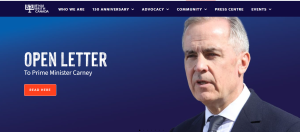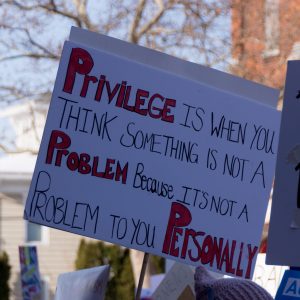As Canadian universities prepare to welcome students for the start of a new academic year, the courtroom has become an extension of the campus battleground. A string of high-profile legal cases—ranging from a million-dollar lawsuit to human rights complaints and judicial reviews—are forcing universities to confront how they handle allegations of antisemitism.
“These cases are very significant,” said Richard Marceau, vice-president for external affairs and general counsel at the Centre for Israel and Jewish Affairs (CIJA). “They could set precedents for what’s happening on campus. Antisemitism is a very present problem, and universities need to understand that if they don’t take it seriously, there can be serious consequences.”
At Toronto Metropolitan University, a Jewish student is suing over what they describe as a “toxic antisemitic environment.” At the University of Windsor, CIJA is challenging a provincial ruling that dismissed concerns about boycott agreements made with encampment activists. And in London, Western University is facing a human rights complaint after the Workplace Safety and Insurance Board (WSIB), Ontario’s workplace compensation agency, linked a medical fellow’s PTSD to antisemitic discrimination on campus.
Together, these cases reflect a turning point. What began as student protests, union resolutions and encampment demands has now moved into the courts, where the outcomes could shape the campus climate for years to come.
Toronto Metropolitan University
At Toronto Metropolitan University, the legal and symbolic stakes are high. In April 2024, a Jewish student and part-time employee filed a lawsuit seeking $300,000 in general and special damages, along with $1 million in punitive damages. The statement of claim describes a “toxic antisemitic environment” that the student says left them feeling unsafe in classrooms, ostracized by peers and ignored by administrators.
“TMU’s negligence and indifference caused the Plaintiff to suffer injury to dignity, feelings, self-respect, and mental health,” the claim reads. “The Defendant’s actions were high-handed, callous, and a marked departure from ordinary standards of decent behaviour.”
The claims have not been tested in court.
The allegations detail repeated antisemitic comments—claims that “Jews control the media,” that “Jews are colonizers,” and even justifications for the Hamas attacks of Oct. 7. When complaints were raised, the student says they were brushed aside as “political in nature and not discrimination.” Faculty, the claim continues, allowed classroom discussions that vilified Israel in ways that spilled over onto Jewish students.
For Marceau, the case represents more than one student’s trauma. “That’s why the amount asked by the plaintiff is so meaningful,” he said. “This is not only about compensating one student—it’s about sending a message that universities can be held accountable if they fail to address antisemitism.”
The case is ongoing in Ontario Superior Court. Marceau confirmed that examinations for discovery were conducted in June 2025 and said the matter is now moving toward a court hearing. TMU responded to The CJN stating it could not comment while the matter is before the courts.
“But, TMU is proudly diverse and intentionally inclusive and the university works hard to promote an equitable and inclusive university community, free from discrimination and harassment. All TMU community members have a shared responsibility for ensuring a culture of respect and inclusion,” the university said in an email.
University of Windsor
If the TMU case is about an individual’s lived experience, the battle at the University of Windsor is about policy. In the wake of last year’s encampments, Windsor’s administration signed agreements in July 2024 that included not pursuing institutional academic agreements with Israeli universities unless approved by the university’s senate.
CIJA filed an application for judicial review in January 2025, asking the court to overturn the Ontario government’s decision to dismiss its complaint under the province’s Discriminatory Business Practices Act.
A hearing is expected this fall. “Our argument in a nutshell is that the government’s decision was unreasonable,” Marceau explained. “Of course, this legislation applies in this case.”
The university, for its part, is standing behind the province. In a statement to The CJN, Windsor said: “The University of Windsor is a respondent in an application for judicial review of an earlier decision by the Ontario Ministry of Public and Business Service Delivery. The University was not a participant in the Ministry’s initial review, but we agree with the Ministry’s decision and have responded accordingly.”
Marceau said CIJA recently received factums from both the Ontario government and the University of Windsor, with a judicial review hearing scheduled for early fall.
Western University
In London, a Canadian-Israeli medical fellow has taken Western University before the Human Rights Tribunal of Ontario after the WSIB validated this student’s post-traumatic stress disorder (PTSD) as the result of antisemitic and harassing conduct on campus. The WSIB ruling was issued in February 2025, and the human-rights complaint was filed on April 3, 2025.
In a press release announcing the complaint, the student accused Western of trying to minimize the allegations. “This has been a direct effort by the university to remove liability instead of addressing the harms caused,” the fellow said. “How can an institution claim ‘interpersonal conflict’ when an independent external investigation verified the allegations were a breach of Code-protected grounds, workplace harassment, and even breaches of the university’s own non-discrimination policy?”
The release also claims Western “denied awareness of any triggering incident” despite senior administrators being in possession of investigation results and other evidence. The complaint seeks damages for injury to dignity, feelings and self-respect, as well as institutional reforms of Western’s antisemitism and harassment policies. It also calls for a pathway for the fellow to resume medical training in 2026.
Marceau argues this case, more than others, shows the toll of unchecked antisemitism. “It reinforces that antisemitism on campus isn’t theoretical—it has real, devastating impacts on people’s lives,” he said.
He added that the case is now moving through the Human Rights Tribunal of Ontario’s process, which he described as “not the fastest,” but confirmed the complaint has been accepted and is proceeding through case management with an adjudicator.
Western responded to The CJN, saying it could not comment on ongoing litigation.
“We encourage anyone who has experienced discrimination on campus to report it directly to Western’s Special Constable Service and/or the Human Rights Office,” the university wrote in an email.
.A broader strategy
These legal fights are part of a larger pattern across Canadian campuses. As The CJN has previously reported in its coverage of the boycott, divestment and sanctions (BDS) movement, universities have been pressured in recent years by encampments, union resolutions and student campaigns to adopt boycott-related measures. What began as political activism is now being tested in courtrooms, with outcomes that could set national precedents.
Marceau insists the courts are only one front in this battle. “The legal work is one tool in the toolbox,” he said. “There’s also the work done by Hillel, by faculty associations, by administrators willing to engage. Together, these efforts are about protecting Jewish students and faculty and ensuring their rights are upheld.”
Behind the scenes, CIJA’s legal task force has been expanding its reach. According to Marceau, the task force is overseen by a steering committee that decides which cases to pursue, supported by a staff lawyer who handles individual complaints and campus-level issues. The group also works closely with outside counsel who have agreed to represent claimants pro bono. “These lawyers are committing their time without charge,” Marceau said, “because they understand how serious this problem is and how important it is to set legal precedent.”
But even if decisions take years to arrive, the cases themselves are already shifting the conversation. For Marceau, that may be the most important lesson. “These aren’t abstract debates,” he said. “When universities allow antisemitism to persist, people are harmed. And the law will hold institutions accountable.”
Author

Mitch is The CJN's campus and education reporter based in Toronto, Ont. He has a passion for investigative research, long-form feature writing and digital journalism. His book, Home Safe, was published by Dundurn Press in November 2022.
View all posts








